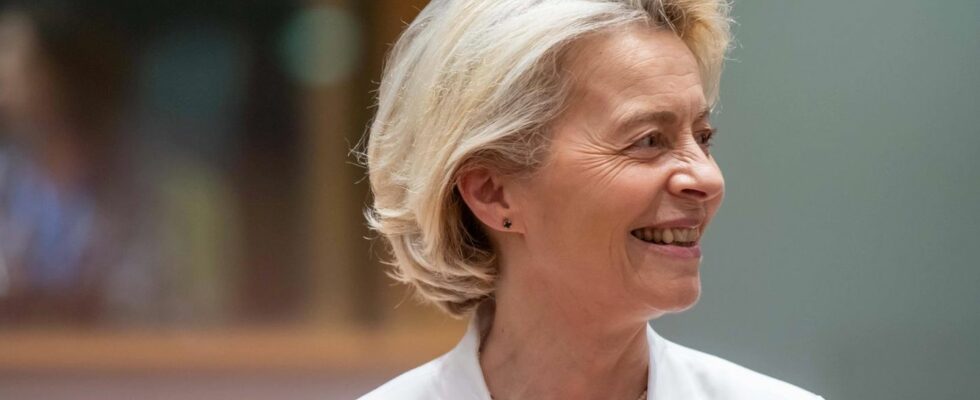Brussels
No agreement on top EU posts: Von der Leyen has to wait
Ursula von der Leyen on Monday evening in Brussels
© Imago Images
About a week after the European elections, Ursula von der Leyen was supposed to overcome another hurdle on the way to a second term as President of the European Commission. But the plan did not work out.
The poker game over who will fill top EU posts after the European elections is going into overtime: The heads of state and government of the EU countries were unable to reach a final agreement on all the details of the planned personnel package at a summit meeting in Brussels on Tuesday night. According to an agreement in principle between the three major party families, this provides for the CDU politician Ursula von der Leyen to remain president of the powerful EU Commission, which is responsible for EU legislative proposals, for another five years.
The liberal Estonian Prime Minister Kaja Kallas would therefore become the new EU chief diplomat. The former Portuguese Prime Minister António Costa is to be elected President of the body of heads of state and government. As Council President, the Social Democrat would then be responsible for preparing the EU summits and chairing the working sessions.
Ursula von der Leyen: It’s all about details
At the end of next week, the heads of state and government will meet for another summit, which is actually supposed to focus primarily on important future issues. The top positions must now be discussed again. Diplomats said that ultimately it was only a matter of details. The six heads of state and government who negotiated on behalf of the three major party families agreed on the names von der Leyen, Costa and Kallas.
Polish Prime Minister Donald Tusk and Greek Prime Minister Kyriakos Mitsotakis are negotiating for the EPP, while German Chancellor Olaf Scholz and Spanish Prime Minister Pedro Sánchez are negotiating for the Social Democrats. The Liberals are relying on French President Emmanuel Macron and outgoing Dutch Prime Minister Mark Rutte as negotiators.
The current EU Council President Charles Michel said last night that the break-up without a final agreement was no surprise to him. The meeting had been planned to provide an opportunity for a detailed exchange of views.
Dispute over the duration of a post
According to diplomats, one reason for the dispute on Monday evening was that the party family with the CDU and CSU parties wanted to ensure that the position of EU Council President was not filled immediately for five years. This would mean that they could theoretically lay claim to the office after two and a half years. The Social Democrats rejected this, according to sources close to the negotiations.
Unlike the President of the Commission and the High Representative for Foreign Affairs, the President of the Council is actually only elected for 2.5 years. However, in recent personnel negotiations, the post, like the other posts, was promised to a party family for five years.
Centre-right coalition claims top job
The bourgeois-conservative EPP became by far the strongest political force in the European elections at the beginning of June, ahead of the Social Democrats and the Liberals. It therefore has the strongest position in the negotiations and is claiming the presidency of the EU Commission for itself.
This is by far the most important position to be filled after the European elections. The incumbent is the boss of around 32,000 employees who, among other things, make proposals for new EU laws and monitor compliance with the European treaties. He also sits at the table as an EU representative at almost all major international summits such as the G7 or G20.
Simple majority is not enough
A so-called reinforced qualified majority is required for the decision in the body of heads of state and government of the EU states. This means that at least 20 of the 27 EU states had to agree and they must also represent at least 65 percent of the total population of the EU.
Currently, a dozen heads of state and government in the European Council belong to the member parties of the centre-right EPP alliance. This is followed by the group of liberals, which includes French President Macron in particular, and the group of social democratic heads of state and government with politicians such as Chancellor Scholz. In order for von der Leyen to be able to take up a second term in office, the members of the European Parliament must also give the green light after the heads of state and government.
Orban sees election result ignored
Criticism of the negotiations between the three major party families came on Tuesday night from Hungarian Prime Minister Viktor Orban, who left the EPP with his party in 2021 after a dispute over the rule of law in his country and has not belonged to any party family since then. The Hungarian wrote after the summit that right-wing parties had become stronger in the European elections, while leftists and liberals had lost ground – yet the EPP had now joined forces with the socialists and liberals. “Today they made a deal and divided the top jobs in the EU between themselves. They don’t care about reality,” wrote Orban. “The will of the European people was ignored in Brussels today.”
However, he did not say whether Orban openly opposed von der Leyen. Croatian Prime Minister Andrej Plenkovic stressed early Tuesday morning: “I have not seen any voice from the Commission President that would have questioned her position.” Von der Leyen left the EU Council building without making a public statement.

